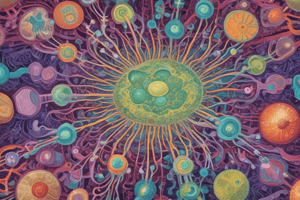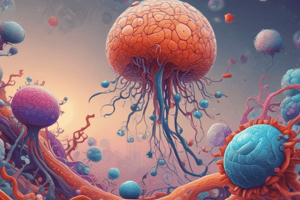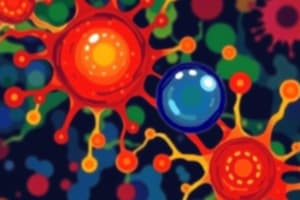Podcast
Questions and Answers
What is the primary function of the mitochondria in a cell?
What is the primary function of the mitochondria in a cell?
- Protein synthesis
- Generating energy for the cell through cellular respiration (correct)
- Modifying and packaging proteins and lipids for transport
- Breaking down and recycling cellular waste
What is the term for the movement of molecules from high to low concentration?
What is the term for the movement of molecules from high to low concentration?
- Diffusion
- Osmosis
- Active transport
- Passive transport (correct)
During which stage of the cell cycle does the cell grow, replicate its DNA, and prepare for cell division?
During which stage of the cell cycle does the cell grow, replicate its DNA, and prepare for cell division?
- Cytokinesis
- Mitosis
- Meiosis
- Interphase (correct)
What is the process by which cells communicate with each other through signaling pathways?
What is the process by which cells communicate with each other through signaling pathways?
What is the term for the process by which cells generate energy from glucose?
What is the term for the process by which cells generate energy from glucose?
Flashcards are hidden until you start studying
Study Notes
Cell Structure
- Cell membrane: semi-permeable, regulates what enters and leaves the cell
- Cytoplasm: jelly-like substance inside the cell membrane, site of metabolic reactions
- Nucleus: contains DNA, controls cell growth and reproduction
- Mitochondria: generates energy for the cell through cellular respiration
- Endoplasmic reticulum (ER): transports proteins and lipids, involved in protein synthesis
- Ribosomes: site of protein synthesis
- Lysosomes: breaks down and recycles cellular waste and foreign substances
- Golgi apparatus: modifies and packages proteins and lipids for transport
Cell Function
- Metabolism: series of chemical reactions that occur within the cell
- Photosynthesis: process by which cells convert light energy into chemical energy
- Cellular respiration: process by which cells generate energy from glucose
- Cell signaling: cells communicate with each other through signaling pathways
- Cell division: cells reproduce through mitosis or meiosis
- Apoptosis: programmed cell death, eliminates damaged or unwanted cells
Cell Transport
- Passive transport: movement of molecules from high to low concentration
- Diffusion: random movement of molecules
- Osmosis: movement of water molecules through a selectively permeable membrane
- Active transport: movement of molecules against their concentration gradient, requires energy
- Pumping: uses energy to pump molecules against their gradient
- Carrier proteins: transport molecules across the cell membrane
Cell Cycle
- Interphase: cell grows, replicates DNA, and prepares for cell division
- Mitosis: process of cell division, resulting in two daughter cells
- Cytokinesis: process of cytoplasmic division
- Meiosis: process of gamete formation, resulting in four non-identical daughter cells
Cell Structure
- Cell membrane is semi-permeable, regulating what enters and leaves the cell
- Cytoplasm is a jelly-like substance inside the cell membrane, where metabolic reactions occur
- Nucleus contains DNA and controls cell growth and reproduction
- Mitochondria generate energy for the cell through cellular respiration
- Endoplasmic reticulum (ER) transports proteins and lipids and is involved in protein synthesis
- Ribosomes are the site of protein synthesis
- Lysosomes break down and recycle cellular waste and foreign substances
- Golgi apparatus modifies and packages proteins and lipids for transport
Cell Function
- Metabolism involves a series of chemical reactions that occur within the cell
- Photosynthesis is the process by which cells convert light energy into chemical energy
- Cellular respiration is the process by which cells generate energy from glucose
- Cell signaling is the process by which cells communicate with each other through signaling pathways
- Cell division occurs through mitosis or meiosis
- Apoptosis is programmed cell death, eliminating damaged or unwanted cells
Cell Transport
- Passive transport involves the movement of molecules from high to low concentration
- Diffusion is the random movement of molecules
- Osmosis is the movement of water molecules through a selectively permeable membrane
- Active transport involves the movement of molecules against their concentration gradient, requiring energy
- Pumping uses energy to pump molecules against their gradient
- Carrier proteins transport molecules across the cell membrane
Cell Cycle
- Interphase involves cell growth, DNA replication, and preparation for cell division
- Mitosis is the process of cell division, resulting in two daughter cells
- Cytokinesis is the process of cytoplasmic division
- Meiosis is the process of gamete formation, resulting in four non-identical daughter cells
Studying That Suits You
Use AI to generate personalized quizzes and flashcards to suit your learning preferences.




